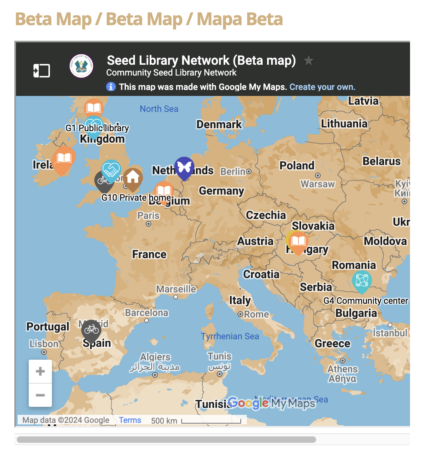- The latest version of the SPAM global crop area distribution model is out. You can play with it here.
- Some bullet points on the USDA’s National Plant Germplasm System outpost in Pullman.
- Yes, the above references Svalbard, as does this piece on Spanish tomatoes.
- Pity we can’t put olives in Svalbard, but there’s a another way to protect olive diversity.
- A breakdown of rice colour diversity. A lot of this stuff will be in Svalbard, with any luck.
- Vanilla will also need attention.
- But gum rockrose seems to be taken care of, at least in Bulgaria. It’s what you make Holy Chrism with.
- So there’s bound to be demand for it, at least in some quarters. Unlike for other opportunity/orphan/neglected crops, but GAIN is on it.
- And if all else fails there’s always AI, be it to fight pests and diseases or find cool plants out in the jungle.
- Why does all this matter? Because of the climate F-word.
Nibbles: Seed info, Potato 101, Coffee 101, Rice repatriation, Iraq genebank, Use or lose, Teff breeding, Micronutrients, Agrobiodiversity, Plant a Seed Kit, WorldVeg to Svalbard, Seed Health Units
- Eastern and Southern Africa Small-scale Farmers’ Forum (ESAFF) launches SEED GIST, a quarterly repository of seed literature.
- A fun romp through potato history.
- A fun romp through coffee history.
- Hong Kong gets some rice seeds back from the IRRI genebank.
- No doubt Iraq will get some seeds back from the ICARDA genebank soon.
- Genebanks are only the beginning though.
- Breeding teff in, wait for it, South Africa.
- The possible tradeoffs of an environmentally friendly diet.
- IIED on the value of agrobiodiversity. Includes an environmentally-friendly and/or nutritious diet.
- Slow Food’s Plant a Seed Kit is all about agrobiodiversity and healthy diets. What, though, no teff?
- WorldVeg knows all about seed kits, and safety duplication.
- Gotta make sure those seeds are healthy, though. Here’s how CGIAR does it.
A census of seed libraries
Nibbles: Seed video, Kew video, Indonesian cassava, Crop maps, Neglected crops, KEPHIS lab, Turkish genebank, Nepal rice, Polynesian sugarcane, Ancient beer, Garlic basics
- Nice video celebrating seeds.
- Nice old video about Kew Gardens.
- Tracing the origins of Indonesian cassava. No, it wasn’t introduced by Kew, but yes, colonialism was involved.
- Latest data on where crops are grown. Including cassava.
- Self Help Africa director turns on to neglected crops. Including cassava.
- New lab in Kenya for spreading clean crops around. Including cassava?
- Türkiye’s genebank in the news. No cassava.
- Nepalese rice gets a Welsh upgrade.
- Collecting sugarcane in French Polynesia to (eventually) support local booze industry.
- Long live the ancient booze bandwagon.
- Garlic 101.
Brainfood: Food shift, Food footprint, Periodic Table of Food, Nutritious food, Diverse food, Food seed kits, Food meta-metrics
- Food matters: Dietary shifts increase the feasibility of 1.5°C pathways in line with the Paris Agreement. Go flexitarian.
- Biodiversity footprints of 151 popular dishes from around the world. Go flexitarian?
- Periodic Table of Food Initiative for generating biomolecular knowledge of edible biodiversity. Unclear if flexitarians have the best molecules.
- Environmentally protective diets may come with trade-offs for micronutrient adequacy. More sustainable may mean less nutritious. Flexitarians unavailable for comment.
- Market engagement, crop diversity, dietary diversity, and food security: evidence from small-scale agricultural households in Uganda. Market access and crop diversification are both good for dietary diversity and food security. The ultimate flexitarianism.
- Sustainability of one-time seed distributions: a long-term follow-up of vegetable seed kits in Tanzania. Now watch flexitarians demand an even playing field.
- Developing holistic assessments of food and agricultural systems: A meta‑framework for metrics users. One framework to rule all of the above.
